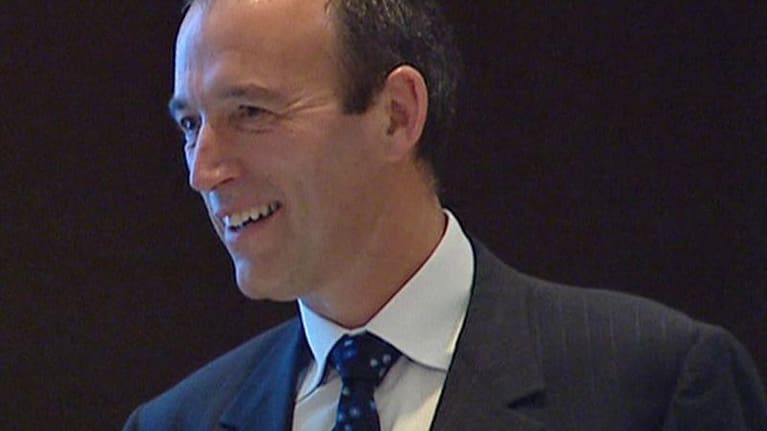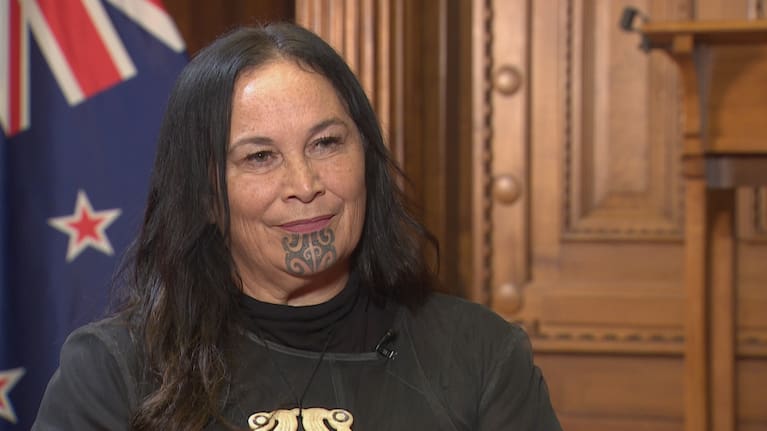Analysis: ACT leader David Seymour's once niche following is swelling well beyond the confines of leafy Epsom. But which elements of our national psyche is this gifted politician tapping into?
It now feels as close to certain as three weeks (and that’s a long time in politics) and swirling, human tides allow, that National will be best placed to form the next government.
Stranger things have happened. E.T. may return on his bike, waving a chrysanthemum and declaring that Chippie reminds him of Elliott. (Woah!)
Or one of the two remaining Chris v Chris TV debates may feature a rapid-fire question, asking – “Who’s your favourite rugby player?” And Chippie answers, “Richie McCaw”, because that’s what the focus group said. But Luxo, who hasn’t prepped for a rugby question, blurts out, “Quade Cooper”! (Woooaaaaah!!!!)
But short of that, it’s Team Chris The Amped Vanilla Guy over Team Chris The Lower Key Vanilla Guy. A triumph for… (brace yourselves) vanilla.

But wait, there’s more! (Or less, depending on your point of view.)
Which is that National (should it be them) will need at least one support or coalition partner. And most likely to be first cab off the rank (or Rank, given how much money Graeme Hart has donated) is ACT, the party that started life as the Association of Consumers and Taxpayers, then made the acronym its name because the Association of Consumers and Taxpayers is a pretty stupid name.
The latest 1News Verian Poll had National and ACT combined at 61 seats. Which is the minimum number of seats you need to form a government. So, it’s not exactly a ringing endorsement. But who needs bells when you’re winning?
Still, there are questions here. And one is, what happens if that 61 seats falls to 60 or 59?
Can you guess who knows the answer to that? Winston Peters, that’s who. Oh, yes he does. As I wrote earlier this month, he’s got his tail ready to pin on that donkey’s arse faster than you can say, “WHAT DOES WAKA KOTAHI EVEN MEAN?!”

Hilariously, though, and not much of this election campaign has been funny, the antipathy between David Seymour and Winston Peters is a thing of rare comedic beauty. It’s like seeing two guinea pigs fighting over which of them is the baddest guinea pig.
On a wildly compelling episode of Te Ao with Moana, Winston Peters declared, “David Seymour discovered his Māori-ness the same way Columbus discovered America, purely by accident.” Seymour replied by accusing Winston Peters of “identity politics”.
Where do you even start with all of this? Under a table, I’d recommend, with a bag over your head.
Having heard “coalition of chaos” come out of Christopher Luxon’s mouth so many times that it’s starting to be as triggering as my phone alarm, I’m reluctant to use the phrase myself. But ACT and New Zealand First both being needed to prop up Chris the Amped Vanilla Guy is potentially KAAAY-OSSS!
(As a revolting aside, I once witnessed someone who was so intoxicated that they shat themselves. And they sat in the chair at this party, very still, hoping everything would somehow take care of itself. I tell this appalling story now because it evokes what a coalition arrangement between National, Act and New Zealand First could potentially be like. “Don’t move, Chris. Don’t move!”)
Anyway, we’ve already looked at “Matua”, as Marama Davidson kept calling Winston Peters on TV3’s Nation Powerbrokers’ Debate on Thursday night, so let’s look at David Seymour and ACT.
'Fairness' in the eye of the beholder
On Monday afternoon, Seymour sent out an email to ACT supporters saying, “the media is determined not to carry our message fairly, so we need YOUR help to get our voice out there.”
He asked for donations.
The response, in less than 24 hours, was “more than $100,000”.
Nice support if you can get it.
“Fairly”, as in Seymour’s insistence that the media haven’t been, is in the eye of the beholder.
But ACT has done fairly nicely out of donations.
RNZ’s Farah Hancock does good work crunching the numbers, and they’re striking. In August, she calculated that “National has received $8.2m since the start of 2021, followed by ACT on $4.2m.”
And to their left? The Green Party has raised almost $1.4m, and Labour, bless them, are at about $1.1m. A seventh of National’s total. (No wonder he’s called “Chippy”, they couldn’t afford the fish.)
Updating her own work this week, Hancock considers the case of New Zealand’s richest man, Graeme Hart, who’s donated $700,000 to parties on the right of the political spectrum in the past two years, including $200,000 to ACT.
Yes, Hart alone has given ACT roughly twice what Te Pati Māori has received, in full. (Unfairness, it’s such a bitch.)

Let’s return to Seymour’s complaint about media fairness, from that fundraising email sent out on Monday.
For some time, the media have had a kind of symbiotic relationship with the ACT leader, in which he quips about more powerful politicians, and gets a quote in the papers or 17 seconds on the TV news because he’s engaging, and entertaining, and often accurate, and acerbic without fear of a BSA complaint. Think of the way Shakespeare used his fools (which Seymour is most certainly not, but nor, and that was the point, were many of Shakespeare’s fools) to say things other characters felt unable to.
The outsider politician, the grouch, the curmudgeon, the heckler… that has often been a role for Winston Peters. But being in Parliament gives you a veneer of legitimacy, and even actual legitimacy, too. And when New Zealand First got dumped in 2020, Winston Peters disappeared from view.
So, rather than unfair, Seymour’s time in Parliament may have been attended by more coverage than has proportionately been warranted. Remember, for six years, from 2014 until 2020, he was ACT’s only MP – thanks entirely to the good people of Epsom and their preparedness to obligingly split their vote. And in 2017, ACT’s party vote was, wait for it, 0.5% – that’s 13,075 votes, nationwide.
But those numbers tell us something else, too. And it is the truly remarkable achievement of going from one MP in 2017 (himself), to ten MPs in 2020. From 13,075 Party votes to 219,030 – in three years.
Lazarus, baby.
The other man with the capacity to so spectacularly lift a party that had basically been reduced to nothing more than himself and his capacity to get attention, is, you guessed it, Winston Peters.
And in some respects, Peters and Seymour have a great deal in common.
But New Zealand First have only ever had Winston Peters. He has led the Party from their first day, the 18th of July 1993, until now. Thirty years, and counting.
A brief and complicated history
ACT’s first leader was Roger Douglas, in 1994, a year after Peters got the job. And since then, like a beauty pageant with loud-hailer neoliberalism as the talent section, they’ve been led by Richard Prebble, Rodney Hide, Don Brash, John Banks, Jamie Whyte and David Seymour himself.
Yes, they’re all men blessed with a self-belief so great that they’d turn up in an occupied country and claim to have discovered it (and then, in Don Brash’s case, grizzle like a baby when the inhabitants pointed out they were already there). But they’re defined by their differences, too.

Banks and Brash came to politics through the National Party.
Douglas and Prebble were Labour, of course. Famously. Or infamously? (Take your pick.)
Hide and Seymour have both been on Dancing with the Stars. Mercifully, Brash hasn’t. (Hide, by the way, dropped his dance partner, then won five seats the following election. Seymour, who was the worst dancer the world has ever seen, won ten seats in the election after he had “danced”. There’s a message here – and it’s bonkers.)
Anyway, Douglas worried that Hide was guilty of “stunts”, when ACT politics contain their own appeal.
And the disagreements between Douglas and Seymour over ACT’s behaviour and direction ended with a piece of pass-agg so brassy it should have been accompanied by a marching band. ACT is now seen as a party that "represents only the wealthy", Sir Roger lamented. “We still respect Sir Roger for his service to New Zealand,” Seymour told The Spinoff in reply, “and hope he is enjoying his retirement.”
Poop, poop!
I haven’t even mentioned Jamie Whyte, who arrived from who knows where, led ACT for less than a year, and whose Wikipedia page tells us his “political philosophy is classical liberalism, in the tradition of Friedrich Hayek.”
Dear old, Hayek, eh?
Whyte wasn’t a natural politician. He was incapable of dissembling. There’s something endearing about that. But it can be problematic when you’re questioned about your licentious views on , um, incest. So great was Whyte’s commitment to the ideal of personal freedom, he responded by saying that as much as he personally found it distasteful, “it’s a question of principle about whether or not people ought to interfere with actions that do no harm to third parties just because they personally wouldn't do it."
Damn, Jamie.
I mean, yes, media training is reducing democracy to the focus-grouped banality of a Hallmark card, but someone in ACT should have told their leader that if they’re having a philosophical wrestle with where on the Hayekian freedom continuum you draw the line, it’s best to do it before you get to incest.
Still, even in Whyte’s almost religious purity there’s a key to why ACT appeals to people. And it’s similar to the appeal that’s made New Zealand First swing back into fashion, so often.
Against the blandness, the ubiquity, and the craven, vanilla “centrism” of the two main parties, ACT offers an edge. A discernible point of difference. Loud enough and strident enough for people lost to the Chris and Chris centre to look up from their ennui and listen.
But, and this is a substantive “but”, it puts ACT in frontier country, and it can get wild out there.
The theme of victimhood
On Q + A, last Sunday, there was one of those scenes in which you realise how very equipped some people are to be politicians.
Jack Tame was interviewing Seymour. And at the end of the interview, he raised the “five ACT candidates who’ve stood down in the past two months”. One, Elaine Naidu Franz, compared vaccine mandates to concentration camps. Another, Anto Coats, described the treatment of the unvaccinated people as “a recipe for political assassination”. And another, Darren Gilchrist, called the former PM "Jabcinda" and linked summer drownings to receiving the Covid vaccine.
Jack Tame asked Seymour, “What does it say about the character of your Party that you are attracting these kinds of people?” And Seymour answered, “I think the fact that those people have stood down shows what the character of our party is.”
That’s high-level chutzpah, to claim the party’s good character is revealed by having as a candidate someone who equates Covid mandates with the Holocaust, but accepting her resignation when the media enquires as to whether that’s appropriate.

No one appears to have known Elaine Naidu Franz felt that way when she became the Party’s Rangitata candidate. But is it revealing of ACT’s character, or their perception of it (and this was the point of Jack Tame’s question), that people with those views considered ACT the appropriate vehicle for them?
Elaine Naidu Franz and Darren Gilchrist only departed after my TVNZ colleague, Benedict Collins, raised their comments with ACT’s leadership.
David Seymour’s response to Benedict Collins’ questions about his party’s own candidates, and even, in one case, a sitting MP, was that it was “B-grade journalism” and “one of the things that really erodes the trust in journalism and my personal respect for some people”.
This was a strange over-reaction. And within a fortnight, whether occasioned by those stories, or not, Seymour had gone to his supporters asking for money with that entreaty, “the media is determined not to carry our message fairly, so we need YOUR help to get our voice out there.”
“Perceiving oneself to be a victim is ubiquitous in American politics”, write Miles T. Armaly (University of Mississippi) and Adam M. Enders (University of Louisville) in their paper, “’Why Me?’ The Role of Perceived Victimhood in American Politics.”
”Victimhood,” they write, “is a central theme of modern political messaging. For instance, a Republican strategist observed, ‘At a Trump rally, central to the show is the idea of shared victimization...Trump revels in it, has consistently portrayed himself as a victim of the media and of his political opponents.’”

This is classic populism, of course.
But the fascinating thing is that ACT’s constituency, historically anyway, has largely been made up of people who are not, to quote Armaly and Anders on Trump, victims “by any serious societal standard”.
In the 2018 Census, Epsom, the electorate Seymour represents, and before him John Banks (2011) and Rodney Hide (2008 and 2005), had the highest proportion among general electorates of those who earnt over $150,000 per year. That they voted ACT, at least at first, was the direct result of a pragmatic accommodation – National needed a coalition partner on the right. (The salutary lesson of National’s collapse after entering coalition with New Zealand First in 1996 having been well and truly heeded – avoid Winston at all costs.)
You can see how precisely this was the case from the 2011 election, following the infamous “cup of tea”, in which John Key signalled to Epsom’s National supporters that they should vote for John Banks. Banks received 15,835 votes to win the electorate, exactly as prescribed, while ACT received only 939 Party votes – 22,800 fewer than National. (They knew exactly what they were doing in Epsom.)
There is a lovely irony in all this. ACT campaigns against “corporate welfare”, but no party has been a more striking recipient of its electoral equivalent.
ACT's interesting 'solutions for real change'
So, the party that began life as the pure and profoundly neoliberal offspring of the father of Rogernomics, has become a populist party appealing to a far broader bunch than just people who know what neoliberalism is.
And this is where David Seymour’s version of identity politics is increasingly playing out.
If you go to ACT’s website, you’ll find that the Party’s “solution for real change” includes abolishing “demographic ministries”.
What does that mean?
Go to ACT’s “Alternative Budget” and you’ll find that it means ACT “would abolish the following demographic ministries: Ministry for Women, Ministry for Pacific Peoples, Ministry of Māori Development, Ministry for Ethnic Communities, Office for Crown-Māori Relations, Human Rights Commission.
Setting aside the Ministry for Women, the “demographic” here, as ACT is using the word in the promise to “abolish the following demographic ministries”, is overwhelmingly brown.
These are “important evolutions you build”, Martyn Bradbury wrote in The Daily Blog, “so that Democracy isn’t just the tyranny of the majority, that those in society with less power are ensured their interests are considered.”
ACT will also “immediately repeal the Māori Health Authority”.
All of this clearly contains a form of identity politics.
As when Seymour told Newstalk ZB that in his “fantasy” closing the Ministry of Pacific Peoples would involve sending “a guy called Guy Fawkes in there and it’d be all over”.
He was joking, Seymour later said, as the shit hit the fan. Carmel Sepuloni was among the people who didn’t find it funny: “David Seymour’s remarks are in line with his history of race-baiting and creating divisions, particularly concerning Pasifika and Māori communities,” she told the NZ Herald.
“We are all one people, and the one people they refer to is non-Māori,” said Te ao Māori advocate Puna Wano-Bryant, responding to ACT’s pledge to scrap Māori Wards.
(Last year, I interviewed Puna Wano-Bryant, at length. When she calls you out, it’s worth listening.)
And on it goes.
On TV3’s Nation Powerbrokers’ Debate on Thursday, Debbie Ngarewa-Packer accused Seymour of “race-baiting with an anti-Māori rhetoric”.

Seymour is Māori, of course. Which is another thing he has in common with Winston Peters.
So here we have it.
The confounding, multi-headed creature that is David Seymour’s ACT. (And ACT is now almost as much Seymour’s party as New Zealand First is Winston Peters’.)
“We believe”, ACT says under the “principles” tab on its website, “it is inherent in the nature of human beings as individuals that they are the owners of their own lives and must be free to act according to their own judgments so long as they accept and respect the like freedom of others.”
But Seymour’s version of this can sometimes feel strangely prescriptive, and at odds with ACT’s cornerstone advocacy of an individual’s right “to act according to their own judgments”.
Stuff reporter Glenn McConnell has written about two occasions in which Seymour has complained about people exercising their own judgments. Did the man who pledged to “abolish” six “demographic ministries” and then “joked” about Guy Fawkes blowing up the Ministry of Pacific Peoples really angrily complain about a poem by Tusiata Avia? Yes, he did.
A major study by researchers at the University of California and Stanford University found the “belief that Whites are losing out to ethnic minorities is particularly prevalent among Trump supporters” and “that reminding White Americans high in racial identification… of the racial demographic shift… significantly increased their support for Trump.”
Seymour circles this precariously. He’s a bright, Māori man. He knows the stench of racism when you get too close.
He’s also a gifted politician. One seat in 2017. Ten seats in 2020. How many seats this election?
Speaking to Toby Manhire (who’s having a great election campaign for The Spinoff), David Seymour accused 1News of having a “nightly witch hunt”. The idea of Benedict Collins as a member of the judiciary in Salem is, um, ridiculous. But maybe it reflects Seymour’s apparent propensity to feel more compelled by his own right to freedom of speech than people he disagrees with?
What is ACT?
Neoliberal? Libertarian? Populist? The battered, half-remembered remnants of the party founded by Sir Roger Douglas? The party of the loyal and wealthy voters of Epsom? Or of less wealthy white people who see themselves as victims of what the American study cited above calls “the threat of increasing diversity”?
Or is it now, somehow, almost as if a reflection of the vast, complex and compelling id of its leader, all of the above?



















SHARE ME